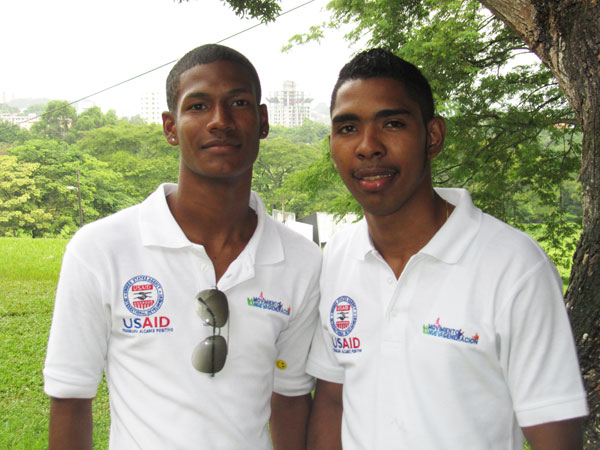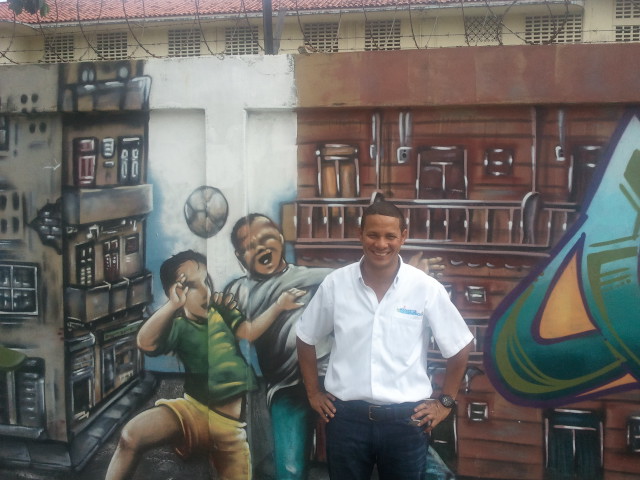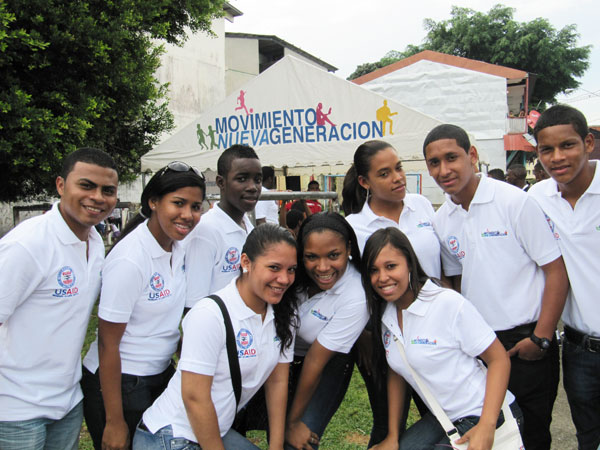[vc_row][vc_column width=”1/1″][vc_column_text]
PANAMA: Paying It Forward The Power of 5
By Michael McCabe, Chief of Party, USAID-Alcance Positivo
[/vc_column_text][/vc_column][/vc_row][vc_row][vc_column width=”2/3″][vc_column_text]
Panama Youth Opportunities Program Creates Cascading Impact

Luis with Eduardo
Eduardo could see himself in Luis. Just a few years earlier, he, like Luis, was trying to escape the violence of his barrio by volunteering and getting connected to a sports program. As Eduardo, one of the Coordinators of the Movimiento Nueva Generacion (New Generation Movement) sports and mentoring program puts it, “my life changed, just as Luis’s because of a mentor and participation in a USAID-funded program. Luis felt like he was in a dark tunnel before he found Movimiento Nueva Generación, but now through the sports, computer programing and mentoring program (funded with support of USAID-Alcance Positivo), he is now giving back to other youth.” The youth mentoring/volunteering program is a symbol of the long term hope and capacity that USAID-Alcance Positivo is seeding in youth and programs such as these.
When Eduardo Tenorio was 8 years old he was surrounded by violence, gangs, and drugs in Chorrillo, one of the most violent neighborhoods of Panama. He and his 7 siblings, tried to maintain their sense of resilience despite their parents separation and a rough surrounding environment. As a youth, he states, he only had two positive opportunities: playing soccer and school. All the rest in his mind were negative opportunities: drugs, gangs and dysfunctional relationships. Initially Eduardo and his friends joined a gang for protection and fun but he soon left it. While 4 of Eduardo’s siblings, including himself completed school, he attributes his resiliency to finding a fledging community youth program called Movimiento Nueva Generacion started by Hector Brands, a dynamic community leader. Through the MNG’s soccer program he found daily structure as well as mentors to help him stay focused on his goals. He is the only one of his siblings who has been able to go on to college to date, and he says that all his friends from his earlier stages of adolescence either ended up in gangs or dead.
He remembers how ages 14-16 were hardest for him to avoid the gangs. As he states, “the only programs around only served youth 8-13 years old, and then suddenly I was without structured activities to protect me.” As he developed, so did MNG’s programming to expand and cover older youth with soccer programming and a new youth IT and cultural after-school center.

Hector Brands, Founder of Movimiento Nueva Generacion.
Through his participation in MNG, he was selected by USAID to participate in a visitors’ exchange on sports for development in Washington D.C. and another in Guatemala. This also helped build his commitment to his soccer skills and he was selected to be part of the Sub-17 National Soccer Team. Today he serves as a Coordinator of Sports and Youth Mentoring with MNG.
Through support of USAID/Alcance Positivo, MNG has received funding to train 25 youth as peer mentors. Those youth have given trainings in local schools and have mobilized 125 youth volunteers from Chorrillo who in turn will work with 900 younger youth on community improvement projects. One of the growing projects of MNG is the World Cup of the Barrios which is held for three months annually. The tournament now engages 5,000 youth from 60 disadvantaged neighborhoods from Colon, San Miguelito, and Panama City among other communities. The youth receive life skills training and soccer skills training as they prepare and move through the tournament.
Movimiento Nueva Generacion is a model of the efforts in Panama by which USAID/Alcance Positivo are trying to engage youth in what it calls the “Power of 5”. These five key assets are factors that have been internationally recognized to help build youth resiliency to violence. They include:
- A mentor or caring adult to help youth reach their goals
- Creative use of their out of school time in a safe environment (OCs, sports, cultural programs, etc.)
- Commitment to one’s education to ensure school completion and a path to a good job
- Information and access to services to make healthy decisions
- Ability to give back or participate in the development of your community
USAID/Alcance Positivo focuses on supporting alliances between a growing private sector interest in youth development and Municipal Violence Prevention Committees that work to coordinate efforts by NGOs, faith-based groups, public sector partners and others around these five core factors.
A key success to the methodology has also been the development of Outreach Centers for youth. These centers run by NGOs or faith-based groups, combine activities around all 5 of the key factors. Fundacion Unidos por Colon, for example runs the outreach center in Barrio Norte of Colon, which until two years ago had some of the highest youth violence rates in the country and the region. On a daily basis, youth come to take computer classes in the new lab, participate in cultural activities such as carnival mask design, and receive tutoring and mentoring on an array of topics. The Executive Director of FUC states: “prior to the center, these kids had no safe place for out of school time activities. This is their home away from home now.” Indeed, in a survey done by USAID/Alcance Positivo, 66% of youth in Colon could not identify a place for safe, out of school time activities. This directly leads to increased gang involvement. The expansion of outreach centers to other barrios looks to counteract that trend.

Youth Mentors from Movimiento Nueva Generacion.
In all projects of USAID/Alcance Positivo, a key effort has been to promote the idea that youth from these communities can be agents of change. This has taken off with the International Association for Volunteer Effort (IAVE) co-organizing with USAID/Alcance Positivo a National Forum on Youth Transforming their communities. The focus is on how each youth can find their voice and raise their sense of self-empowerment through identifying simple ways to make change. In some cases such as Fundacion Jesus Luz de Oportunidad, it has been ex-gang members speaking at schools on the importance of avoiding gang life. In others, such as Casa Esperanza, it has been their Alcance Juvenil program getting youth from some of the toughest barrios who have never been asked or offered the opportunity to serve, to come up with simple ways of making change such as beach clean ups. In the case of MNG, Hector founded a movement that has paid it forward to Eduardo who in turn has paid it forward to Luis, who is now paying it forward to 125 youth volunteers who will in turn pay it forward to 900 children in Chorrillo and other communities to help make healthier more secure communities.[/vc_column_text][/vc_column][vc_column width=”1/12″][/vc_column][vc_column width=”1/4″][vc_widget_sidebar sidebar_id=”sidebar-primary”][/vc_column][/vc_row]